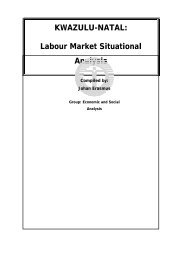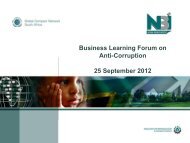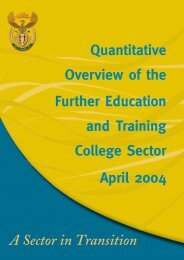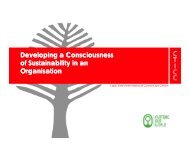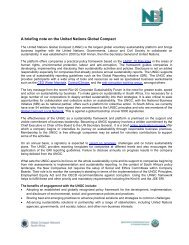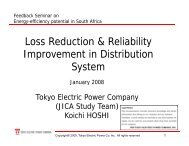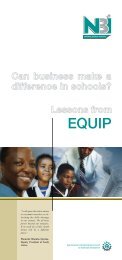Sustainable Forest Finance Toolkit - PwC
Sustainable Forest Finance Toolkit - PwC
Sustainable Forest Finance Toolkit - PwC
- No tags were found...
You also want an ePaper? Increase the reach of your titles
YUMPU automatically turns print PDFs into web optimized ePapers that Google loves.
Costs and benefits of certification:Case study 1 – Malaysia3 of 4About half (10) of the companies questioned quoted specificpremiums for logs, sawn timber, plywood, furniture and otherproducts. The highest premiums quoted were for FSC timberto supply Europe, followed by FSC timber bought for the USmarket, and the lowest premiums achieved were for timbercertified to MTCC. In both Peninsular and East Malaysia,premiums of 30 to 40 per cent or higher were achievedthrough 2006 for FSC plantation and hardwood logs and 10to 15 per cent for FSC plywood and furniture. Meanwhile,premiums of between one and five per cent were quoted forMTCC logs and plywood.It should be noted that these price premiums are highlyvariable. Views are often conflicting within the industry; theremaining 10 companies felt premiums to be negligible (butcould not provide evidence) or had no firm view. Manysuppliers complained of shortages in supply of both certifiedand uncertified timber, which is undoubtedly helping to pushup current prices. However, as demand for certified timberlooks set to increase ahead of supply, these premiums arelikely to remain.Is there a business case for forestcertification?Under current market conditions of high raw material pricesand competition from lower-wage manufacturing economies,certification can make good business sense. Under thesecircumstances, the winners are likely to be those companiesthat acquire sufficient forest resources to secure their rawmaterial supply, invest in downstream, value-addedprocessing, and sell certified products to internationalmarkets that pay the highest prices. The financial servicessector can potentially play an important role in facilitatingthat transition.The business case for FSC and MTCC will depend on: themarket supplied (which will determine premiums for certifiedproducts but also market access for uncertified products);the cost implications (dependent on the conditions coveredearlier) and tenure (if implementation costs can be recoveredduring the course of a longer or extended concessionlicence, it will be easier for companies to bear the costs ofcertification). However, the business case alone will notdetermine a Board’s decision; also crucial are thecompanies’ current and forecast financial positions and theirability to absorb a short-term reduction in profits.Across the country as a whole, uptake of forest certificationin Malaysia by the private sector has been very slow, withjust one MTCC certificate and two FSC certificates issued tocompanies. The slow uptake is due to a number ofcommercial, political and cultural factors, as well as the factthat in many instances companies do not yet see acompelling business case for forest certification. The studyidentified several reasons for this, listed below.1. There is a lack of information on market demand andprice premiums available for certified products.2. Under current certification requirements, forestmanagement companies holding plantation licences withsignificant existing natural forest cover would be requiredto forgo their right to convert the existing natural forestcover, significantly reducing the volumes of timber thatcould be extracted. Only one licence holder in Sabah isknown to be pursuing this option.3. Current price premiums alone may not offset the costs ofcertification and associated reductions in timber harvestin some FMUs. Typical implementation costs may be toohigh for companies making smaller profits, and internalrates of return may be reduced to levels unacceptable toinvestors.4. The predominant trade pattern for Sabah andSarawak is that primary and secondary products(logs, sawn timber and plywood) are exported toregional markets (primarily China, India and Japan)where there is little or no demand for certifiedproducts.5. There is a widespread shortage of skills andexperience in responsible forest management andcertification during this research. This was a key issueaffecting performance in several FMUs visited duringthe course of this research.The incentives that most companies interviewed look forin certification are an agreed certification standard (no‘moving goal posts’), strong and stable demand forcertified products, and guaranteed price premiums.The study found that several companies are in theprocess of developing their own financial analyses toexplore or make the business case for certification to theirBoards. Further research on these analytical approachesand methodologies would be of use to companies, as wellas to banks and investors who need to recognise theconditions under which certification can be viable in orderto make strategic investments.Unfortunately, there is a lack of information on the impactof current logging practices on the long-term value ofMalaysia’s forest assets. The industry is therefore largelyignorant of what future harvest yields are possible. Thisprevents a true assessment of the business case forresponsible forestry and certification.There is a lack of information on the impact ofcurrent logging practices on the long-term value ofMalaysia’s forest assets.Page 14pwc



